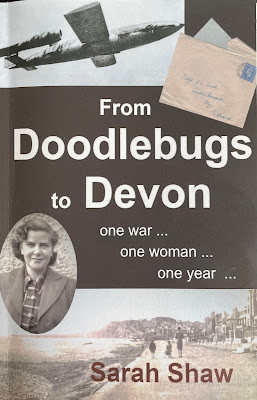 |
| From Doodlebugs to Devon cover (author's photo) |
Sarah Shaw's latest book "From Doodlebugs to Devon" is subtitled "one war...one woman...one year..." and is very much a personal journey for the author, for the "one woman" mentioned in the title happens to be Sarah's mother, Yvonne Shaw, whose letters to her husband form the basis of this book.
I have to declare an interest in this book now because during the various Covid lockdowns and the periods in between, I assisted Sarah in a very small way by checking and verifying the various BC4 Bomb Census reports for some of the V-1 and V-2 incidents that are referred to in this book, both in Yvonne's letters and in the narrative that the author skilfully weaves around them, which help provide context to the letters and help the reader get a real idea of what was happening in the wider world of the British "Home Front" at this later stage of the Second World War.
Yvonne Shaw and her four-year-old son, Oliver begin the period covered in this book living in Foxley Lodge, a Victorian detached house in the outer London suburb of Purley, to the south of Croydon and at that time, still in the county of Surrey. Yvonne is almost 33 and her husband Clem, is an army officer stationed in Scotland. His work is something of a mystery to Yvonne but we soon learn in the author's narrative that he is actually working with the Home Guard in Scotland.
The first letter to him we read is dated 1st April 1944 and apart from mention of an air raid late in the preceding month (one of the last such raids by manned Luftwaffe aircraft), most of these early letters cover the relatively mundane life of a young wife with a husband serving in the armed forces, somewhat struggling to make ends meet and finding life in wartime London fairly boring.
It is when the Doodlebugs mentioned in the book title start falling that the tone of the letters suddenly change. As most people know, "Doodlebug" was one of the nicknames given by the British people to the V-1, the first of Hitler's so-called "Vengeance Weapons", a pilotless aircraft as they were somewhat quaintly called initially by the British Civil Defence service, before they were given the name of "FLY" for "Flying Bomb", which is essentially what these weapons were - an early form of cruise missile.
Croydon was to become the most "Doodlebugged" borough in London. This was not due to any particular singling out of the citizens of the south London suburbs but more due to subterfuge on the part of the British, who had double agents on the ground whom the Germans were convinced were providing them with accurate information regarding the fall of shot of the V-1s. Whereas in fact most of them were initially falling as intended on the central area of the capital, false information fed to them by one agent in particular, Juan Pujol Garcia, better known as Agent Garbo, persuaded the Germans to adjust the targeting of these devices downwards, so that they would fall on what in 1944, were the much more lightly populated areas of outer suburban London, rather than the densely packed inner London.
It was a terrible decision by the authorities to have to take, for whichever option ensured that people would die. In the end, it was just about numbers and sadly, Croydon became the recipient of 141 these weapons.
Yvonne's growing anxiety is reflected in her letters to Clem and she reports some very close calls nearby which although they do not directly impact the family home, happen to be far too close for comfort and it is clear from the tone of her writing that the mental strain is growing, as well as concern for the well-being of young Oliver.
As a result of this and a phone call from her uncle in Exmouth, Yvonne and Oliver decamp to Devon, at first staying with her Uncle Dudley and family but later moving to Budleigh Salterton and enduring something of an odyssey of moves and re-locations to various parts of that delightful seaside town, although doubtless in 1944, it was somewhat different to the Budleigh Salterton that I am quite familiar with today.
The letters home, which sometimes cover seemingly quite mundane matters, actually provide an interesting window of this important period of British history and the author's accompanying commentary and explanations, provide a fascinating context.
The book ends with a chapter which tells us about the family from 1945-1973, which sadly doesn't provide us with a particularly happy ending to the story - but there will be no further spoilers from this reviewer!
Sarah Shaw has produced a delightful social history of wartime Britain which I would thoroughly recommend to you.
Available from www.amazon.co.uk
RRP: £11.99
softback, pp 227 (also available as an e-book)

No comments:
Post a Comment